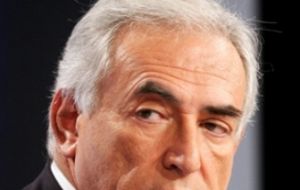MercoPress. South Atlantic News Agency
IMF identifies three challenges faced by Latinamerica as world crisis recedes
 Managing Director Dominique Strauss-Kahn praised the region’s performance
Managing Director Dominique Strauss-Kahn praised the region’s performance Removing fiscal stimulus, absorbing capital flows and reducing unemployment are the main challenges facing Latinamerican and Caribbean countries as the global crisis recedes, said IMF Managing Director Dominique Strauss-Kahn during this recent visit to South America.
Countries that followed sound policies fared the crisis rather well but as the recovery advances they face challenges associated with strong capital inflows and overheating, anticipated Strauss-Kahn.
The main reason why Latin America bounced back so fast—better than many other countries and better than in the past—was because starting positions were good, Strauss-Kahn said in a speech in Lima, Peru, during the Third Meeting of Finance Ministers of the Americas and Caribbean.
“These countries did not make the mistakes of many advanced countries by going on a debt-fueled spending binge or using complex financial engineering to magnify risk,” he said. “Rather, they learned from past mistakes, and embraced cautious and prudent economic policies.”
Strauss-Kahn pointed out that Latin American country benefited from flexible exchange rates, significant international reserve buffers, and a more credible monetary policy than before. Because banking systems and corporate sectors were generally healthy, the region did not have a financial crisis of its own.
The IMF chief this week ended a trip to Brazil and Peru where he met with government leaders, leading figures from the private sector, and with students and academics as part of efforts to engage more closely with stakeholders in the region.
Policymakers in Latin America and in the rest of the world are faced with major policy challenges as the crisis recedes. Strauss-Kahn outlined three key challenges for Latin America:
Removing fiscal stimulus: removing economic stimulus as the recovery proceeds will be a delicate balancing act—“exit too soon, and you will kill the recovery, exit too late, and you may sow the seeds of the next crisis,” Strauss-Kahn said. In Latin America, where the recovery is more advanced, a natural starting point would be to remove temporary fiscal stimulus. Fiscal correction can take some heat off monetary tightening, which, in turn, can dampen excessive capital inflows.
Absorbing capital inflows: countries with strong fundamentals, like many in Latin America and in other regions, will likely receive large and sustained capital inflows over the coming years. The challenge will be to absorb these flows effectively and avoid the build-up of vulnerabilities. A range of tools can be deployed, including exchange rate appreciation, reserve accumulation, tighter fiscal policy, and macro prudential measures, Strauss-Kahn noted. Capital controls can sometimes play a role too, but should not be used to avoid needed adjustment, he added.
Reducing unemployment: as unemployment stays high, an economic crisis can quickly turn into a social crisis, Strauss-Kahn said. Specific labor market policies can help limit the damage—adequate unemployment benefits can support confidence, protect household incomes, and avoid increases in poverty. Education and training programs can also help.
In the past, big external shocks had dramatic social consequences for Latin America. For example, it took the region a quarter century to undo the jump in poverty that followed the 1980s debt crisis. “But this time was different, because countries allocated funds to social policies and social safety nets provided a crucial lifeline, Strauss-Kahn stated.
Historically, inequality has been a Latin American curse. Not only did it prevent large swaths of the population from sharing in income gains, but it also contributed to widespread social and political instability—which, in turn, hurt economic prospects.
But during this recession, many countries preserved basic social spending and social safety nets. “This is something the IMF pushed for in country programs. I think it was incredibly important. Not only did it protect the most vulnerable from the ravages of the crisis, but it also contributed to social and political stability,” Strauss-Kahn said.




Top Comments
Disclaimer & comment rulesCommenting for this story is now closed.
If you have a Facebook account, become a fan and comment on our Facebook Page!